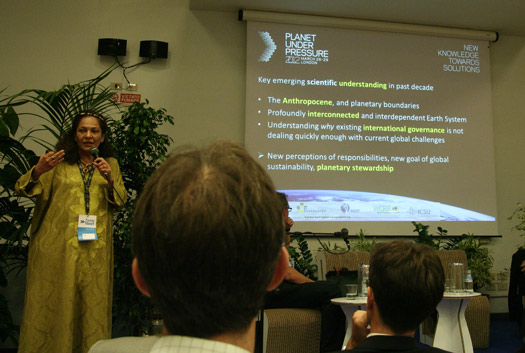
Lidia Brito (Unesco) 'The Science says we should act now' (= anyone opposing our ill defined initiatives is Against The Science)
Dear Amanda Porter
Thank you for choosing my denial disorder as a researchobject. In my first posting i – your object of research- quoted the following from your Sociology/Communication-group website Talking Climate on Climate Change:
The evidence for climate change is so overwhelming that you might expect the facts to speak for themselves. Unfortunately they don’t – which means that using the most effective methods for communicating climate science is critical.
I will end this posting with a question to you, of which I hope you will be able to answer: just to prevent that I end op as suffering from ’the white male-effect’ (Slovic& Flynn.
How to be naive: a course for the advanced
In following postings I will demonstrate that this sentence from ‘Talking Climate’summarizes the total naivity and lack of intellectual reflection that is the hallmark of the hordes of ‘experts’ circling around the true scientists.
Those – more influenced by popular culture than understanding of what science is- who use the authority that science in general has to pursue other agendas. Mostly by framing a complex debate – where different branches of science interact- between The Science and the morons (those diverging from groupthink) to be converted. Conversion is executed after finding out how to appeal to their irrational emotions, or just by bullying.
To me this tactic is all too familiar
This tactic to avoid true debate was also effectively pursued in Dutch Nature Conservation from the ’90s (my area of specialism) by ecologists like Frans Vera, who had a far-going influence on Dutch Nature Policy.
He and fellow ideologues also succeeded to silence opponents by portraying their view on nature as ’the only real ecology’ versus those little sentimental gardeners who do not understand the important processes in Nature. How the debate was killed is effectively summarized by science philosopher Jozef Keulartz in ‘critique of the radical ecology’
In reality his view was only a limited vision based on closed system-equilibrium-thinking, with a touch of American Wilderniss-romanticism. Adopting an evolutionary ecological view would mean the end of his large herbivore romance. Apart from that, all archeological evidence has debunked his theories. But Vera won many debates by rethorics, succeeding to portray his victims as ’the emotional people who don’t understand true ecology’.
Han Lindeboom, the Underwater-Vera
The same tactic is now applied by the Frans Vera of Marine Ecology against fisheries, Han Lindeboom and green government officials that use science for agenda-driven ideals: framing a debate between ’true experts’ and people with unfounded emotions: this is the false contradiction that some greenies and government-officials – mostly trained in Wageningen- literally referred to: ‘you may express your emotions’.
While in reality their wilderniss-underwater ideals are founded in the same outdated holistic thinking, where ‘disturbance’is bad when it comes from humans but ‘natural’ and thus good if it is caused by storms. So that ‘erasing human influences’is the same as ‘nature restoration’. This reasoning with a ‘balance of nature’-touch has nothing to do with scientific ecology, but more so with popular culture thinking from the seventies with roots in Greek Philosophy.
The problem: when adopting a dynamic view of nature, most grand-design-nature-policies would have to be terminated and many green bureaucrats would loose their job
The Theory of Nature, and the Nature of THeory
Here is one of my favourite books to learn from, that you should read first before you actually might get one clue of what your talking about, when talking about ‘overwhelming evidence’and when you and fellow sociologists or worse’communication scientitst’claim to have a perfect grip of what ‘science’ actually is: and especially how it is (mis)used in the policy arena.
Now here we have an important quote, page 183 of ‘Ecological Understanding, The Theory of Nature and the Nature of Theory’, from an ecologist who wants to practice better science, Steward Pickett. I sincerely believe that this is the real thing to be debated- improving science, and the use in the policy-interface.
The idea of the balance of nature has influenced- and continues to influence- what and how science is used by managers and planners. If scientists, who have the weight of empirical evidence to consider, still fall in to equilibrium or balance-of-nature-thinking, how much easier it is for non-scientists (climatists/sociologists RZ) to do so.
However, there is, simply no single or persistent balance of nature. It is time for a fair turnabout from science to society. Perhaps the scientific appreciation that a strict balance of nature is rare or unlikely manens taht the insight can be translated to society.
Pickett proposes a new metaphore like ’the flux of nature’, doing more justice to the fact that natural systems change on every timescale and are dynamic instead of bound to an ‘undisturbed’static equilibrium, which also means that there is no principal difference between human and natural influences. I quote
It emphasizes the dynamism, UNCERTAINTY (let me help you RZ), and contingency of ecological interactions and structures.
Your Homework before the interview: what elements of popular culture have polluted climate-thinking by non-experts and sociologists
Now can you outline what the relation of the former thinking in ecology and it’s policy interface is to the climate debate, ánd why I believe this is relevant? The next blog will summarize my position on ‘climate change’, but first I had to add this posting. This is because of my suspicion that intellectual reflection is not the strongest quality of Nottinham sociologists or worse ‘communication scientists’, nor of most academics operating in the climate-policy-interface.

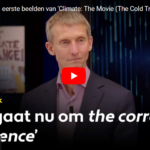

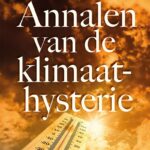
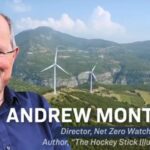
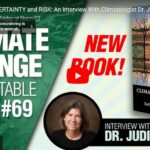
(Did you notice: i made a nasty remark on 'bureaucrats': my social group is now recognised. It is now proven that i suffer from a worse case of white male effect being 'highly individualist, neglecting risks and distrusting authorities': this 'science' also means that if you are a black women and easy to scare you are more inclined to believe climate sociologists and long for return to a slave master/large bureaucracy to rule your life. Yes, i believe social science is mostly politically motivated protestgeneration ('68)-generated junk thank you)
This sociologic approach has the character of a professor Stapel type of survey!
Beste Rypke,
wat je schrijft over Frans Vera klopt min of meer als is het niet zo zwart/wit als jij het opschrijft. Hij heeft geprobeerd zijn visie op natuurbeheer door te drukken bij het minsterie zonder aandacht te hebben voor andere visies, en mensen met andere visies zwart te maken. Er is echter een heel groot verschil met de "klimaat discussie". Er is altijd grote wetenschappelijke oppositie geweest tegen de theorien van Frans Vera. Lang niet alle wetenschappers waren/zijn het met hem eens en er zijn veel wetenschappelijk studies die zijn ongelijk aantonen. Ondanks een interessant proefschrift heeft Frans Vera zijn resultaten ook nooit in internationale tijdschriften gepubliceerd.
In de klimaatwetenschap is dit totaal anders. Bijna alle studies tonen aan dat meer CO2 in de atmosfeer tot gevolg heeft dat de temperatuur op aarde hoger wordt. Daarnaast tonen bijna alles studies en theorien aan dat opwarming van de aarde resulteert in verandering van de hydrologische cyclus. De wetenschappelijke discussie gaat uiteindelijk over (1) de onzekerheden in het systeem aarde die heel groot zijn en (2) de preciese gevolgen op menselijke en natuurlijke systemen en hoe groot het risico uiteindelijk is (ook in relatie tot de onzekerheden) en hoe we daar mee omgaan (mitigaite vs adaptatie).
Dus over de ecologische theorien van Frans Vera was totaal geen wetenschappelijk consensus. Dus gebruikte Frans Vera andere middelen om zijn ideeen er door te drukken. bij de discussie over klimaatverandering is er op critische punten wel een consensus en dus zijn de strategien als die Frans Vera helemaal niet nodig.
Rypke, heel raak weer ! Ik vind het wel bewonderenswaardig dat je hier een discussie aangaat, want ik heb niet meteen het idee dat de dame in kwestie open zal staan voor argumenten. Maar hopelijk vergis ik me.
@ Martijn Jansen:
Je stelt: "Bijna alle studies tonen aan dat meer CO2 in de atmosfeer tot gevolg heeft dat de temperatuur op aarde hoger wordt." Ik wijs er op dat dit formeel gezien nooit is bewezen. Het wordt aannemelijk geacht op basis van fysische wetmatigheden en op basis van de constatering dat modellen met een CO2-effect het temperatuurverloop van de 20e eeuw beter beschrijven. Dat is beslist wat anders dan 'aantonen'.
Verder stel je: "Daarnaast tonen bijna alles studies en theorien aan dat opwarming van de aarde resulteert in verandering van de hydrologische cyclus." Alweer "bijna alle". Dan ben ik toch wel benieuwd naar die studies, want ik ken juist meerdere hydrologische studies die vaststellen dat er ondanks de opwarming van de aarde nog maar weinig daaraan te relateren trends in afvoerreeksen van allerlei rivieren zijn geconstateerd. Zie studies van Robert Hirsch, of van Wil Alexander. Maar ja, dat zijn natuurlijk maar studies gebaseerd op feiten. Ze kloppen niet met wat de modellen verwachten, dus weg met die feiten. Toch?
Martijn,
Het onderhavige “onderzoek” maakt deel uit van zo’n strategie!
En vervang voor de lol in je eerste zin de naam Vera eens door Vellinga of beter nog: Rotmans.
Kom je al een heel eind.
Ik doe er nog een schepje bovenop bij Paul.
Deze Stapeliaanse postdoctoralia gaat NIET LEZEN omdat ze weet dat ze het niet gaat begrijpen. Te moeilijk allemaal, bovendien te lui. Let op mijn woorden, je zal het zien.
Eigenlijk een beetje zoals ik dus. Met dit verschil dat ik hotelier ben en mij niet op kosten van de gemeenschap een positie probeer te verwerven noch uit ben op applaus van de mensen die dienst uit maken.
En kom nou maar op met die groene duimen!